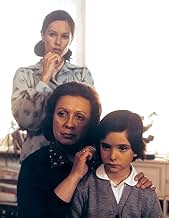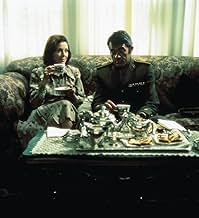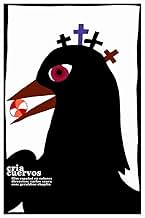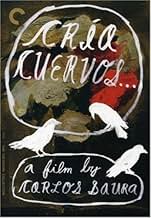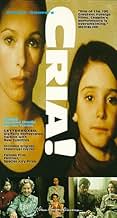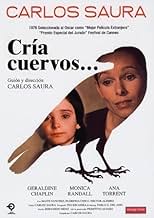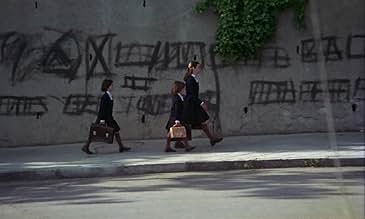CALIFICACIÓN DE IMDb
7.9/10
12 k
TU CALIFICACIÓN
Tres hermanas huérfanas bajo la custodia de su tia severa y su abuela discapacitada tendran que aclimatarse a las nuevas condiciones e su vida compartida, superar los impedimentos constantes... Leer todoTres hermanas huérfanas bajo la custodia de su tia severa y su abuela discapacitada tendran que aclimatarse a las nuevas condiciones e su vida compartida, superar los impedimentos constantes de la vida y en el proceso, crecer.Tres hermanas huérfanas bajo la custodia de su tia severa y su abuela discapacitada tendran que aclimatarse a las nuevas condiciones e su vida compartida, superar los impedimentos constantes de la vida y en el proceso, crecer.
- Dirección
- Guionista
- Elenco
- Premios
- 8 premios ganados y 4 nominaciones en total
Conchita Pérez
- Irene
- (as Conchi Perez)
Mayte Sanchez
- Maite
- (as Maite Sánchez)
Mónica Randall
- Paulina
- (as Monica Randall)
Josefina Díaz
- Abuela
- (as Josefina Diaz)
Germán Cobos
- Nicolás Garontes
- (as German Cobos)
Héctor Alterio
- Anselmo
- (as Hector Alterio)
Julieta Serrano
- Ana
- (voz)
- Dirección
- Guionista
- Todo el elenco y el equipo
- Producción, taquilla y más en IMDbPro
Opiniones destacadas
Sensational film that dispenses a brooding plot and considered to be one of the best Spanish films , in fact was voted one of the best Spaniard film by professionals and critics in 1996 Spanish cinema centenary . Well directed film by Carlos Saura , including his own story and screenplay , who tried to create an enjoyable flick plenty of symbolism and metaphor by tackling a description about a particular family formed by three little girls , their stiff aunt and grandmother . This slow-moving and intelligent picture is well set in Spain of the 70s , in Madrid, the orphan sisters Ana , Irene, and Maite (Ana Torrent ,Conchita Perez , Maite Blasco) are raised by their spinster aunt (Monica Randall), after dieing their mother by a painful illness , and living together their silent and wheelchair-bounded grandmother . Melancholic Ana is traumatized after viewing death of her daddy (Hector Alterio ) in bed and painful disappearance her mum (Geraldine Chaplin who married Carlos Saura) , and she drifts into her own fantasy world . The fragile , single little Anna dreams of meeting her mom and she is obsessed by death .
Sensitive film full of feeling , haunting mood-pieces , wonderful images and sense of wonder . However , it turns out to be some claustrophobic , being mostly filmed at a Madrid mansion and brief outdoor scenes in Quintanar, Segovia, Castilla y León . This extraordinary flick spells through intricate patterns of frames , sets , sound and color . The title in Spanish stems from the phrase "Raise ravens and they'll pluck out your eyes" , the equivalent phrase in English would be "you reap what you sow". This film was notorious in the years of the Franco's downfall dictatorship including provoking and polemic issues and played by known and prestigious actors as Geraldine Chaplin , Monica Randall and Hector Alterio . In addition , a magnificent support cast such as German Cobos , Mirta Miller and special mention to Florinda Chico as a likable servant . His style is pretty much dry in the atmosphere as in the fresh dialog , as well as realistic , and including fantastic elements as when appears the ghost mother . ¨Cria Cuervos¨ is one of Saura's undisputed masterpieces and fundamental in his filmography where shows efficiently some peculiar characters and shot at the height of his creativity, in a period cultural difficult, where the enormous censorship of the political regime exacerbated the ingenuity and imagination of the scriptwriters . Splendid , luxurious photography with juicy atmosphere by Teo Escamilla who along with Luis Cuadrado are considered to be two of the best Spanish cameramen , both of whom worked for Saura . Interesting screenplay by the same director based on a original story . Moving and emotive musical score by Federico Mompou and of course the unforgettable theme song "Porque Te Vas" sung by Jeanette that was an enormous European hit , and appealed even to people who didn't understand Spanish language . This touching picture will appeal to Spanish films buffs ; being deservedly nominated for Golden Globe , and another 8 wins & 3 nominations . Rating : Top-notch and outstanding movie , worthwhile seeing .
The motion picture perfectly produced by magnificent producer Elias Querejeta was stunningly directed by Carlos Saura , a good Spanish movies director. He began working in cinema in 1959 when he filmed ¨Los Golfos ¨(1962) dealing with juvenile delinquency from a sociological point of view . He subsequently made LLanto por Un Bandido (1964) starred by an European all-star-cast . Saura is a well recognized filmmaker both nationally and internationally, and in proof of it he won many prizes among which there are the following ones: Silver Bear in Festival of Berlin for Peppermint Frappé (1967) and the successful La Caza (1966) that also won numerous prizes in International Festivals and in which four characters facing each other and terminating into a jarring burst of violence . Saura achieved Special Jury Awards in Cannes for La Prima Angélica (1974), in 1973, and for Cría Cuervos (1976), in 1975. Also, the film Mamá Cumple Cien Años (1979) got an Oscar nomination in 1979 as the best foreign film, and it also won the Special Jury Award at the San Sebastian Festival. He subsequently made ¨Deprisa , Deprisa¨ based on facts about juvenile delinquency in Spain since the 80s , as he tried to take a position in favour of outcast people and he got to make a both lyric and documentary-style cinema . In 1990, he won two Goya , The Spanish Oscar , as best adapted screenplay writer and best director . Saura became an expert on Iberian musical adaptations as ¨Carmen , Amor Brujo , Bodas De Sangre , Sevillanas , Iberia , Salome , Fado, Flamenco ¨ and even recently Opera as ¨Io , Don Giovanni¨
Sensitive film full of feeling , haunting mood-pieces , wonderful images and sense of wonder . However , it turns out to be some claustrophobic , being mostly filmed at a Madrid mansion and brief outdoor scenes in Quintanar, Segovia, Castilla y León . This extraordinary flick spells through intricate patterns of frames , sets , sound and color . The title in Spanish stems from the phrase "Raise ravens and they'll pluck out your eyes" , the equivalent phrase in English would be "you reap what you sow". This film was notorious in the years of the Franco's downfall dictatorship including provoking and polemic issues and played by known and prestigious actors as Geraldine Chaplin , Monica Randall and Hector Alterio . In addition , a magnificent support cast such as German Cobos , Mirta Miller and special mention to Florinda Chico as a likable servant . His style is pretty much dry in the atmosphere as in the fresh dialog , as well as realistic , and including fantastic elements as when appears the ghost mother . ¨Cria Cuervos¨ is one of Saura's undisputed masterpieces and fundamental in his filmography where shows efficiently some peculiar characters and shot at the height of his creativity, in a period cultural difficult, where the enormous censorship of the political regime exacerbated the ingenuity and imagination of the scriptwriters . Splendid , luxurious photography with juicy atmosphere by Teo Escamilla who along with Luis Cuadrado are considered to be two of the best Spanish cameramen , both of whom worked for Saura . Interesting screenplay by the same director based on a original story . Moving and emotive musical score by Federico Mompou and of course the unforgettable theme song "Porque Te Vas" sung by Jeanette that was an enormous European hit , and appealed even to people who didn't understand Spanish language . This touching picture will appeal to Spanish films buffs ; being deservedly nominated for Golden Globe , and another 8 wins & 3 nominations . Rating : Top-notch and outstanding movie , worthwhile seeing .
The motion picture perfectly produced by magnificent producer Elias Querejeta was stunningly directed by Carlos Saura , a good Spanish movies director. He began working in cinema in 1959 when he filmed ¨Los Golfos ¨(1962) dealing with juvenile delinquency from a sociological point of view . He subsequently made LLanto por Un Bandido (1964) starred by an European all-star-cast . Saura is a well recognized filmmaker both nationally and internationally, and in proof of it he won many prizes among which there are the following ones: Silver Bear in Festival of Berlin for Peppermint Frappé (1967) and the successful La Caza (1966) that also won numerous prizes in International Festivals and in which four characters facing each other and terminating into a jarring burst of violence . Saura achieved Special Jury Awards in Cannes for La Prima Angélica (1974), in 1973, and for Cría Cuervos (1976), in 1975. Also, the film Mamá Cumple Cien Años (1979) got an Oscar nomination in 1979 as the best foreign film, and it also won the Special Jury Award at the San Sebastian Festival. He subsequently made ¨Deprisa , Deprisa¨ based on facts about juvenile delinquency in Spain since the 80s , as he tried to take a position in favour of outcast people and he got to make a both lyric and documentary-style cinema . In 1990, he won two Goya , The Spanish Oscar , as best adapted screenplay writer and best director . Saura became an expert on Iberian musical adaptations as ¨Carmen , Amor Brujo , Bodas De Sangre , Sevillanas , Iberia , Salome , Fado, Flamenco ¨ and even recently Opera as ¨Io , Don Giovanni¨
Ana (Ana Torrent), a sad-eyed little girl of about eight years old, unable to sleep, overhears a conversation as she walks down the stairs to get a glass of water. The voices, coming from her father Anslemo's (Hector Alterio), room, are exchanging expressions of mutual love. Ana hears the gasp of a man's voice crying that he is suffocating and then silence. A woman that she recognizes as Amelia (Mirta Miller), the wife of army officer Nicolás (Germán Cobos), her father's best friend, hurriedly leaves the room and heads for the front door, her blouse still unbuttoned. When the girl goes into her father's room, he is dead. She calmly takes the almost-emptied glass of milk next to his bed and washes it in the sink, then carefully puts it back on the kitchen rack.
It's title derived from the Spanish proverb "Raise ravens and they'll take your eyes," Carlo's Saura's haunting Cria Cuervos is a masterful insight into the mind of a little girl traumatized by the death of both of her parents. We see events from Ana's perspective and its fragmented view of an imaginative but angry and resentful child is a mixture of fantasy and reality that is often hard to separate. The film is also seen by some as an allegory for the mindset of the dying days of the Franco dictatorship. Whether it is viewed as a political statement or not, Cria Cuervos' evocation of the painful memories of a child whose grasp on reality is fading is masterful and deeply moving, especially given Ana Torrent's heartfelt and authentic performance.
Ana is one of three sisters. The older one is Irene (Conchita Pérez) and the younger one is Maite (Maite Sanchez). The little girl has visions of her mother talking to her, giving her advice about staying up too late, and reading stories to her in bed. Ana deeply longs for her mother (Geraldine Chaplin) who died of a painful illness before her father passed away. In voice-over we hear the adult Ana (also played somewhat confusingly by Geraldine Chaplin) recalling her memories from childhood and she has little good to say about them, saying that she remembers it being "interminably long and sad, full of fear." The children are now under the care and protection of their Aunt Paulina (Mónica Randall), who lacks warmth and affinity, and some have compared her haughty nature to the authoritarianism of the Franco government.
As a result, the children are much closer to Rosa, the family maid, who talks to them about family secrets even though much of what she says goes over their head. Also living with them in their country estate is the girls' grandmother, disabled and unable to speak who loves to look at family pictures on the wall, trying to recapture her fading memories of the past. The girls play at being adults. Irene puts on her aunt's bra and does her lashes. Pretending to be her father, Irene draws a moustache on her face while Maite wears high heels. Ana puts on lipstick as they act out their version of memories recalled from the many arguments they heard between their unfaithful father and their depressed and anxious mother.
The motif of death runs throughout the film. Ana believes she poisoned her father and fantasizes about also killing her aunt. She even mixes some baking soda in her aunt's milk, thinking it is poison. In one sequence, Ana looks down a busy Madrid street from her roof and pictures herself jumping to her death. The children also play hide-and-seek in which the one whose hiding place is discovered has to pretend to die and remain "dead" until Ana offers a prayer to her guardian angel to "revive my sisters." Although we are somewhat buoyed by the scene of the end of the summer with the girls going back to school, we are left to wonder whether the family's cynicism and negativity will carry over into the children's adult life. The adult Ana's voice-over, heard without any context, is not promising.
It's title derived from the Spanish proverb "Raise ravens and they'll take your eyes," Carlo's Saura's haunting Cria Cuervos is a masterful insight into the mind of a little girl traumatized by the death of both of her parents. We see events from Ana's perspective and its fragmented view of an imaginative but angry and resentful child is a mixture of fantasy and reality that is often hard to separate. The film is also seen by some as an allegory for the mindset of the dying days of the Franco dictatorship. Whether it is viewed as a political statement or not, Cria Cuervos' evocation of the painful memories of a child whose grasp on reality is fading is masterful and deeply moving, especially given Ana Torrent's heartfelt and authentic performance.
Ana is one of three sisters. The older one is Irene (Conchita Pérez) and the younger one is Maite (Maite Sanchez). The little girl has visions of her mother talking to her, giving her advice about staying up too late, and reading stories to her in bed. Ana deeply longs for her mother (Geraldine Chaplin) who died of a painful illness before her father passed away. In voice-over we hear the adult Ana (also played somewhat confusingly by Geraldine Chaplin) recalling her memories from childhood and she has little good to say about them, saying that she remembers it being "interminably long and sad, full of fear." The children are now under the care and protection of their Aunt Paulina (Mónica Randall), who lacks warmth and affinity, and some have compared her haughty nature to the authoritarianism of the Franco government.
As a result, the children are much closer to Rosa, the family maid, who talks to them about family secrets even though much of what she says goes over their head. Also living with them in their country estate is the girls' grandmother, disabled and unable to speak who loves to look at family pictures on the wall, trying to recapture her fading memories of the past. The girls play at being adults. Irene puts on her aunt's bra and does her lashes. Pretending to be her father, Irene draws a moustache on her face while Maite wears high heels. Ana puts on lipstick as they act out their version of memories recalled from the many arguments they heard between their unfaithful father and their depressed and anxious mother.
The motif of death runs throughout the film. Ana believes she poisoned her father and fantasizes about also killing her aunt. She even mixes some baking soda in her aunt's milk, thinking it is poison. In one sequence, Ana looks down a busy Madrid street from her roof and pictures herself jumping to her death. The children also play hide-and-seek in which the one whose hiding place is discovered has to pretend to die and remain "dead" until Ana offers a prayer to her guardian angel to "revive my sisters." Although we are somewhat buoyed by the scene of the end of the summer with the girls going back to school, we are left to wonder whether the family's cynicism and negativity will carry over into the children's adult life. The adult Ana's voice-over, heard without any context, is not promising.
I have seen several thousand films in my life and this one became the top one almost instantly. Ever since I have watched it several times and it has never failed to impress and delight me - it even increases the sense of mystery undelying in its baroque and compelling history. On my opinion, it is Carlos Saura's masterpiece and perhaps the best film ever made about the mysterious inner world children live in and create. There is so much to be enjoyed in this film, that a conventional review will not make it justice.
In Madrid, the orphan sisters Irene (Conchota Pérez), Ana (Ana Torrent) and Maite (Maite Sánchez) are raised by their austere aunt Paulina (Mônica Randall) together with their mute and crippled grandmother after the death of their mother (Geraldine Chaplin) and their military father Anselmo (Héctor Alterio). Ana is a melancholic girl, fascinated by death, after seeing her mother having a painful death and her father dead in bed.
"Cria Cuervos" is a beautiful and sad movie of Carlos Saura that can be watched in two levels: in the first plane, it is a film that recalls the style of the family dramas of Ingmar Bergman. However, in a deeper level, the story is actually a metaphor of the recent Spanish political history, and each character represents a segment of their society: Ana's father represents the military dictatorship of Franco; her dying mother, the republic; her grandmother, those who miss the republic; Ana is probably the youth with a sad childhood surrounded by deaths. The conclusion is a message of hope for the people. I believe that those familiarized with the Spanish history would find many other elements, but in both levels this movie is wonderful. The title is a reference to the Spanish proverb "Cría cuervos y te sacaran los ojos" which means "Raise the ravens, and they will remove your eyes". Ana Torrent shows her amazing talent in the beginning of her successful career. My vote is eight.
Title (Brazil): "Cría Cuervos " ("Raise Ravens ")
"Cria Cuervos" is a beautiful and sad movie of Carlos Saura that can be watched in two levels: in the first plane, it is a film that recalls the style of the family dramas of Ingmar Bergman. However, in a deeper level, the story is actually a metaphor of the recent Spanish political history, and each character represents a segment of their society: Ana's father represents the military dictatorship of Franco; her dying mother, the republic; her grandmother, those who miss the republic; Ana is probably the youth with a sad childhood surrounded by deaths. The conclusion is a message of hope for the people. I believe that those familiarized with the Spanish history would find many other elements, but in both levels this movie is wonderful. The title is a reference to the Spanish proverb "Cría cuervos y te sacaran los ojos" which means "Raise the ravens, and they will remove your eyes". Ana Torrent shows her amazing talent in the beginning of her successful career. My vote is eight.
Title (Brazil): "Cría Cuervos " ("Raise Ravens ")
10fern-2
What a wonderful movie! Saura has succeeded showing us the inside of childhood. One has to be a great artist to be able to reflect the true feelings of a child thrown in the turmoil of life. Little Ana's eyes are a world of suffering, of understanding, of emotions. This child has seen death, she has known it directly and she has no fear. Either to experience it or to give it or to see it. Thank you Mr Saura, after 23 years, you still give us these great moments of life.
¿Sabías que…?
- TriviaThe title in Spanish stems from the phrase "Raise ravens and they'll pluck out your eyes." The equivalent phrase in English would be "you reap what you sow."
- Créditos curiososThe closing credits identify Cancion y Danzas Number 5 of Frederic Mompou. But it was definitely Number 6 that we heard.
- ConexionesFeatured in Zomergasten: Episode #4.1 (1991)
- Bandas sonorasCanción y Danzas N.6
Composed by Frederic Mompou (as Federico Mompou)
Selecciones populares
Inicia sesión para calificar y agrega a la lista de videos para obtener recomendaciones personalizadas
- How long is Cría Cuervos?Con tecnología de Alexa
Detalles
- Fecha de lanzamiento
- País de origen
- Sitio oficial
- Idioma
- También se conoce como
- Cría Cuervos
- Locaciones de filmación
- 15 Calle de María de Molina, Madrid, España(family house)
- Productoras
- Ver más créditos de la compañía en IMDbPro
Taquilla
- Total a nivel mundial
- USD 14,548
- Tiempo de ejecución1 hora 45 minutos
- Mezcla de sonido
- Relación de aspecto
- 1.66 : 1
Contribuir a esta página
Sugiere una edición o agrega el contenido que falta

Principales brechas de datos
By what name was Cría cuervos (1976) officially released in India in English?
Responda
